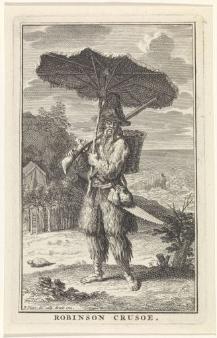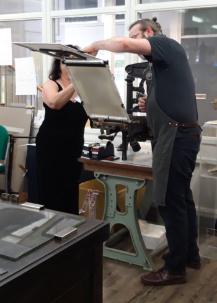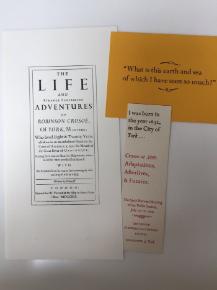Crusoe at 300 conference report
Posted on 19 August 2019

Organised by Dr Chloe Wigston Smith and Dr Gabriel Cervantes (University of Glasgow), the Centre for Eighteenth Century Studies and the Department of English and Related Literature hosted the sixth Biennial Meeting of The Defoe Society on 10-12 July, 2019.
The conference opened with a visit to the Thin Ice Press, in which Prof. Helen Smith and Dr JT Welsch introduced delegates to the ‘print room’ and the various printing presses owned by the English Department. After learning a little about the Press itself, and being given a demonstration on how to set type, delegates were invited to try their hand at using one of the presses. Under the guidance of the Thin Ice Press team, everyone was able to make their own replica of the title page for Robinson Crusoe. The workshop was supplemented by a specially designed commemorative bookmark and pop-up at the opening reception.
As the conference got fully underway, we welcomed over 50 fifty scholars from across the globe who shared their research into Defoe’s work and his wider world. With panels ranging from religion to science and scale, animal history to war and empire, and circulations of text to madness and solitude, the conference reflected the breadth of research currently going on within Defoe studies. Different theoretical approaches were also seen throughout the papers with presenters challenging the way in which Defoe is traditionally read by engaging with queer theory, methods of digital analysis, and material culture. While this was a conference celebrating the anniversary of a specific text, it was also a vital exploration of the wider milieu in which Defoe was writing, with lively and rigorous engagement with Defoe’s wider worlds in a global eighteenth century.


Delegates make their own title pages on a 1847 Tabletop Albion press
The President’s roundtable addressed the question of “Going Farther with Crusoe”, and focussed on The Farther Adventures of Robinson Crusoe– a work that often isn’t encountered in the English-speaking world, but which is still published together with Robinson Crusoe in other languages, particularly Spanish. Chaired by John Richetti (University of Pennsylvania), this session gathered a variety of perspectives on what is to be gained by changing our perceptions of Robinson Crusoeand remembering that it is, in fact, a novel in three parts. Reflections on this were given by Chris Borsing (Trinity College, Dublin), Maximillian Novak (UCLA), Manushag Powell (Purdue University), Rajani Sudan (Southern Methodist University), and Rivka Swenson (Virginia Commonwealth University).
Continuing this trend of looking at the afterlives of Defoe’s 1719 text, the conference also featured a session on Contemporary Robinsonades, sponsored by Writers at York. Peter Robinson (University of Reading) read from his new book, The Constitutionals: A Fiction and discussed the praxis of adaptation in conversation with Dr JT Welsch. Robinson’s book follows a figure who was called Crusoe in childhood as he sets out to avert global catastrophe, hoping to trigger the end of neoliberalism by going for a walk. Tellingly, ‘Crusoe’s’ wife goes by the name of Friday.
The two plenary sessions were given by Dr Nicholas Seager (Keele University), who spoke about “Defoe, Robinson Crusoe, and Allegory”, and Prof. Barbara Benedict (Trinity College) on “Collecting and Recollecting: Defoe’s Survival Guide to Exile”. Thanks go to both for two fascinating talks.
We would also like to thank York Georgian Society and the team at the Thin Ice Press for their support with this event, which took place in the Humanities Research Centre and in the historic King’s Manor.
Further details about this event can be found on the Centre for Eighteenth Century Studies’ website.
